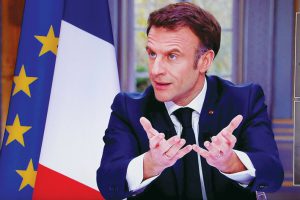BLOOMBERG
Top diplomats from Group of Seven (G-7) nations sought to project unity on China and other issues after French leader Emmanuel Macron stirred unease across the bloc with a conciliatory tone on a recent trip to Beijing.
“The last day has only reinforced the convergence of views that we have on the approach to the most important issues of the day,†Secretary of State Antony Blinken said alongside French Foreign Minister Catherine Colonna, following a meeting in the mountain resort of Karuizawa, Japan.
The statement of harmony masked differences behind the scenes that spilled into the open following Macron’s state visit to Beijing, after which he said the European Union (EU) should avoid being dragged into a dispute with China by the US. The trip amounted to a diplomatic coup for Chinese leader Xi Jinping, who has sought to divide the US and its long-time allies.
Macron’s comments, which came as he gave support to Xi’s efforts to bring peace to Ukraine, caused anger and confusion among European Union partners. They also surprised the Japanese, who have often tried to balance security concerns about China with deep economic ties.
German Foreign Minister Annalena Baerbock, who also attended the meetings in Japan, struck a starkly different tone during and after her own trip to Beijing. While new Foreign Minister Qin Gang sought to impress her, including with a trip from his hometown of Tianjin to Beijing, Baerbock emerged more skeptical with China than before, according to a person familiar with her thinking.
Baerbock felt lectured by Qin and was disappointed that China’s leadership wasn’t willing to call Ukraine’s president, Volodymyr Zelenskiy, as part of a peace plan from Xi that many Western countries see as pro-Russian, the person said.
Baerbock underscored that Germany wouldn’t compromise on its values when it comes to engaging with China. In response to a question on Taiwan, she said that “Europe won’t look away†if international law is violated.
“I made clear in China: We want to cooperate, we want to be partners, but we are not naive,†she told reporters in Japan.
Baerbock and her French counterpart both briefed their colleagues about their China visits as part of attempt to coordinate messaging on how the EU should approach the world’s second-biggest economy.
They agreed on an approach that emphasised trying to cooperate with Beijing wherever possibly, while de-risking their economic reliance on China and sending clear signals that Chinese weapon deliveries to Russia — as well as military escalation with Taiwan — would be unacceptable, this person said.
The G-7 has translated its close coordination on arming Ukrainian forces over the last year into a renewed dialogue on the challenges presented by China, a senior State Department official told reporters. The group sees the need to stay engaged with China while standing up against any coercive measures or efforts to change the status quo in Taiwan, the official said.
 The Gulf Time Newspaper One of the finest business newspapers in the UAE brought to you by our professional writers and editors.
The Gulf Time Newspaper One of the finest business newspapers in the UAE brought to you by our professional writers and editors.
